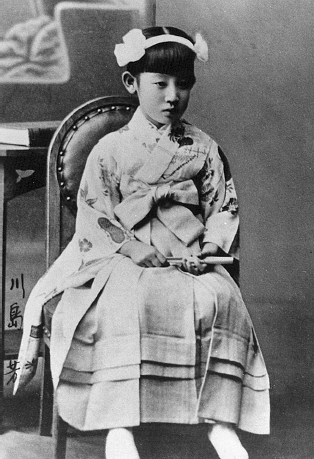Prince Su’s descendants, who eventually became involved in financial disputes with Naniwa and his heirs, have other explanations for Naniwa’s willingness to take their family members into his home. They point out that Naniwa lived like a rich man in Japan though he did not have a job or income of his own, and depended upon the money he received from Prince Su for raising these children, as well as other funds that came his way because of his connection to the family. “Naniwa was loose about women and money,” one commentator notes.
Yoshiko’s distress under Naniwa’s care emerged gradually, though looking back from the perspective of today, her pain seems inevitable. But today of course is not yesterday, when even royal children, and especially women, were expected to remain stoical in the face of any manner of personal catastrophe. Emotional collapse, violence, shredding a rival’s clothing—these were not the stuff of behavioral primers of the time. But when such incidents reached the public eye, the newspapers strove to accommodate a curious public, especially when the person involved was a former Qing princess living in Japan. Throughout Yoshiko’s life, her dramas received extensive coverage.
After her arrival, Yoshiko found herself under the supervision of Naniwa’s wife, Fuku, whose mental health had worsened because of her husband’s infidelities, his hot temper, and frequent absences. Fuku had been married off to Naniwa after one of his adventures in China, and though her parents had been put off by his ill-mannered behavior and had at first balked at the match, they eventually agreed to let their daughter marry this man they had sized up as frugal and serious, as well as rude and sixteen years her senior.
Yoshiko in Japanese clothes Courtesy Hokari Kashio
“Once Fuku was back in Japan,” Naniwa’s highly partisan biographer writes, in the bland tone he adopts for this woman’s emotional collapse,
the tensions she had been feeling quickly eased. She was extremely tired and took to her bed. Her fatigue fed upon her terrible sluggishness and attacked her without pause. … She also lacked any understanding of her husband’s work and sometimes was very cold to him. Kawashima was very busy working for his independence movements and often would return home late. For days, he might be away from home. As his time away increased, his wife’s criticisms multiplied, and she’d confront him with her complaints. … Wearied by his endeavors, bumping up against complex problems, Kawashima finally would start shouting, though he did not really mean it. There was no peace, and an increasingly fierce storm raged through their lives.
If Fuku was a trial to the children in the house, then Naniwa presented them with other problems as the years passed. He had left for China for the first time in 1886, with dreams of fomenting those great changes in China, establishing a new regime in the Northeast and thereby bringing great benefit to his homeland. He had been the trusted secret liaison between the Japanese government and Manchu royalists seeking to return to power. Over the years, these and other endeavors decisively and publicly failed. Once at the forefront of the “independence” movement in Manchuria and Mongolia, he was gradually tossed aside by Japanese officials, who no longer relied on the services of amateurs like him. It has been speculated that Naniwa “lost his balance” after his failed attempts to set up a Japanese-backed regime in Manchuria and Mongolia.
Naniwa also eventually lost his hearing, and deafness made him even more ill-tempered and dependent upon others. Harada Tomohiko, a young relative, offers this portrait of Naniwa in retirement:
In those days, right-wing hotheads set the tone in Kawashima’s house. … Weirdos and strange China rōnin connected to [the ultranationalist group] Gen’yōsha infested the place. The live-in students and the rest saw themselves as heroic types in training for great deeds. The world of these hotheads seemed idiotic to me, but from their point of view I was just some heretic.
I used to get emergency telegrams from Naniwa to come and help him with something. In those days only inns or businesses or rich people had phones. Even if people lived close to each other, forty or fifty minutes away, they’d send a telegram when they wanted something.
“Now what?” I’d ask myself and go over.
You couldn’t say it was anything very important. He’d ask me to prepare a batch of ink for him or straighten out the calligraphy paper. When Naniwa was in a cheerful mood, he could be a really good old guy. He’d narrow his eyes, let out with a good laugh, and tell some stories. He didn’t really have many interesting stories, and mostly he gave little lectures. As I said before, he couldn’t hear, and so I’d have to write down my answers or anything else I wanted to say. It was a real pain.
While I was writing, he would warn me about various things: “Today’s Tokyo Imperial University is a den of socialists—a place where lots of germs all get together. Don’t you dare associate with them.”
“Yes, yes,” I’d say, looking at him meekly.
“And don’t drink any liquor. Your father used to be an interesting person, but alcohol ruined him. Don’t fall into the same trap.”
Naniwa didn’t like to drink liquor. After a few drinks his face would become bright red.

